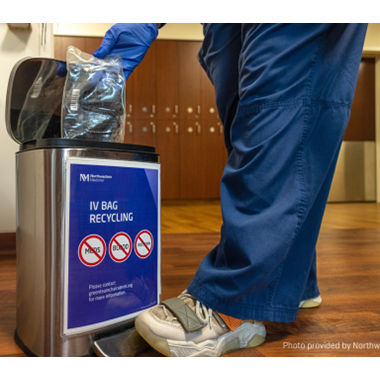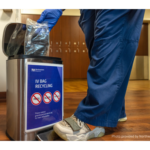Baxter International announced that it has completed the first phase of its intravenous (IV) bag recycling program pilot and is now expanding the pilot program. Launched in conjunction with Northwestern Medicine in Chicago, the program has diverted more than six tons (or 12,000 pounds) of polyvinyl chloride (PVC) IV bag waste from landfills to be recycled for use in other nonmedical products.
“Across the country, hundreds of thousands of IV bags are used every day. Baxter is a proud manufacturer and supplier of these bags, which are ubiquitous in hospital care—particularly single-use plastic containers that provide patients clinically essential solutions including fluids, nutrition and medicines,” said Cecilia Soriano, president of Baxter’s Infusion Therapies and Technologies division. “In line with Baxter’s commitments as a responsible corporate citizen, we believe this pilot helps pave the way for meaningful, long-term waste reduction.”
Unlike other medical equipment products such as syringes and needles, which have established post-use collection methods, standard practice for non-hazardous IV bag removal includes draining of residual fluid and disposing as waste that ultimately ends up in a landfill. Through this pilot program, stakeholders from several Northwestern Memorial Hospital departments, including nursing, supply chain and environmental services, helped develop a new nursing workflow that would allow for material separation for recycling, while also managing space constraints common to hospital settings. Working with third-party logistics and recycling partners, the collected IV bags are transported and inspected to ultimately be recycled into products such as industrial floor mats and protective edging for docks and landscaping. All IV bags involved in this pilot were made of PVC.
“We are proud to pilot this program with Baxter to be the first health system in the nation to begin recycling PVC IV bags,” said Jeff Good, Northwestern Medicine’s first chief sustainability executive and vice president of operations. “What started as a single-unit pilot is now standard practice across several of our inpatient units within Northwestern Memorial Hospital and has resulted in the recycling of more than 170,000 IV bags. Our health system understands the environmental importance of this pilot program and we are dedicated to creating initiatives that support our overarching sustainability goals to reduce our carbon footprint and eliminate unnecessary waste.”
Baxter announced that its objective for the pilot’s first phase was to establish proof of concept for a program that assists hospitals in recycling plastic IV bags manufactured by Baxter. Following the successful conclusion of the pilot phase, Northwestern Medicine will continue to implement the program and will explore expanding the program throughout the health system. Baxter is now actively seeking to engage additional health system participants in the Chicago area to further validate the process and economic feasibility to support long-term, large-scale implementation with potential roll out to other health systems across the country.
Image courtesy of Northwestern Medicine







